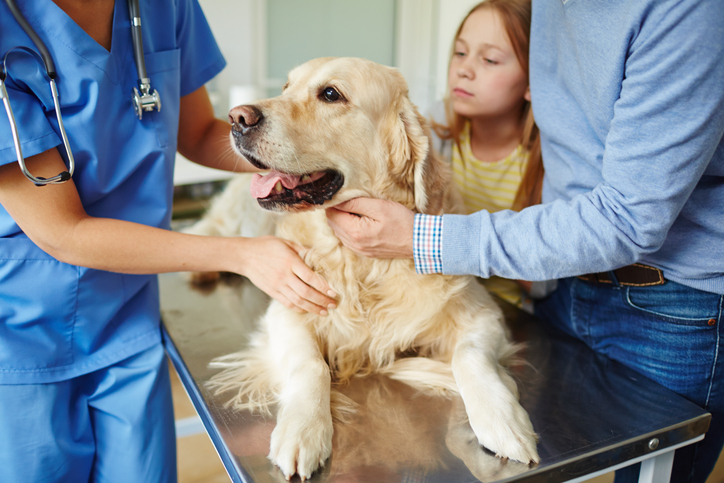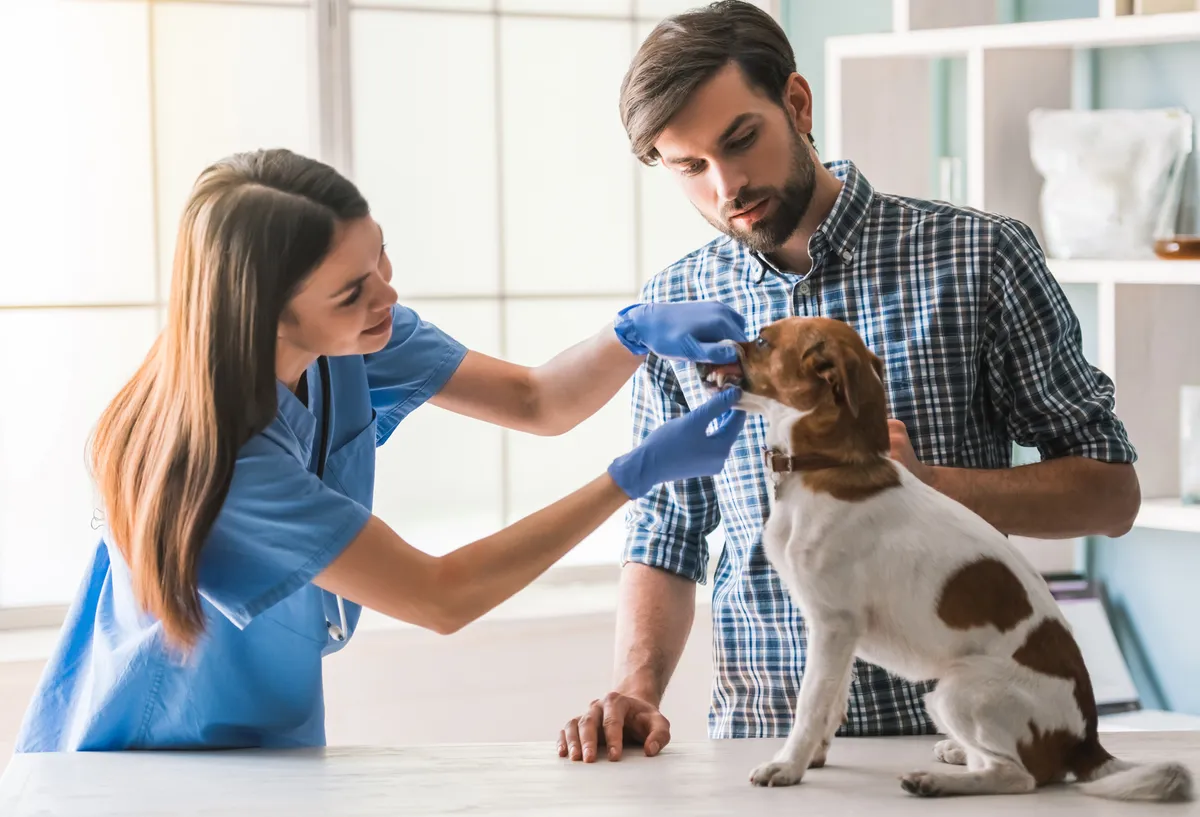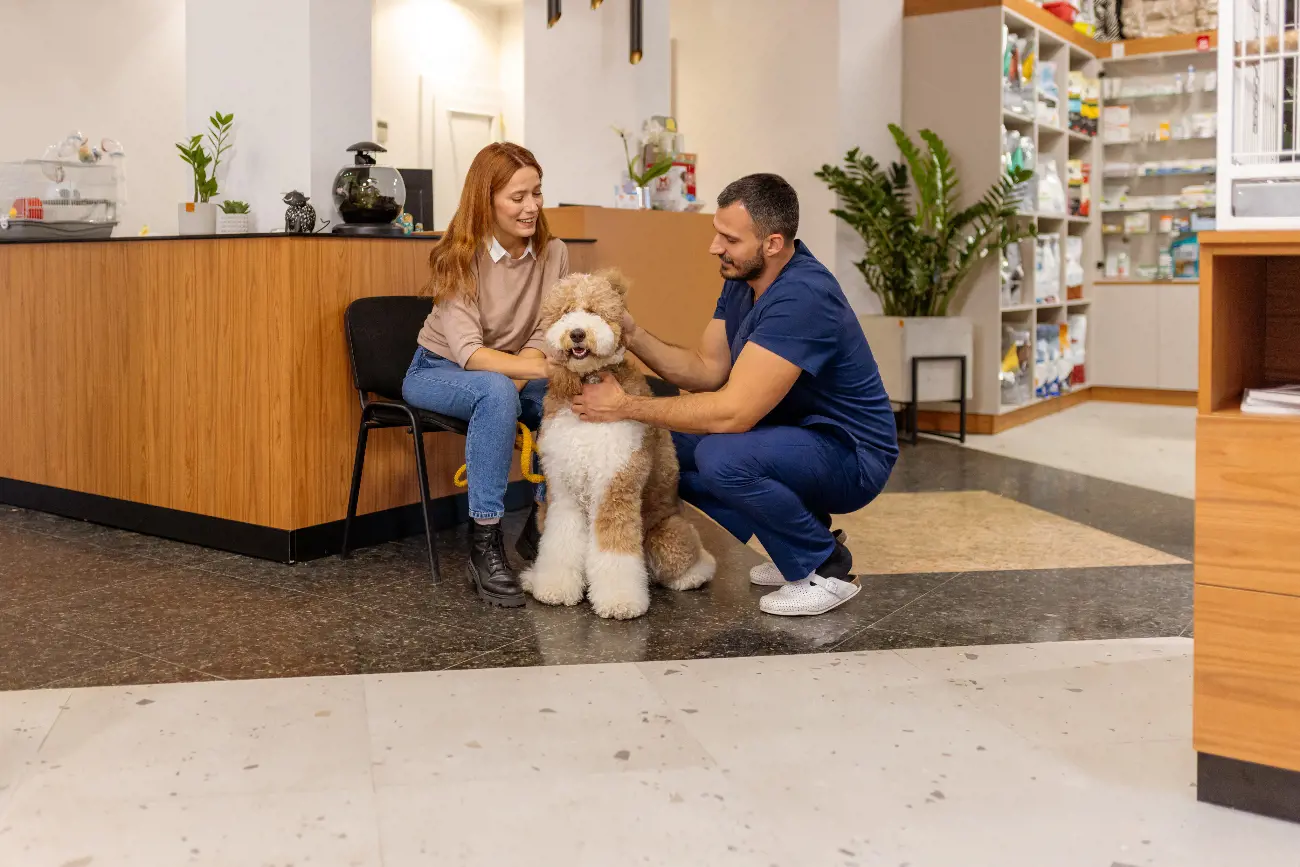What are phantom pregnancies in dogs?
12th June, 2025

Has your female dog started hoarding toys and growling if you come close? Or does she seem lethargic and out of sorts?
Phantom pregnancies are surprisingly common in unspayed dogs, fooling owners and their pets alike into thinking a litter of puppies is on its way. Depending on your perspective, that can be a delightful idea – or an alarming one!
Although dog false pregnancy symptoms should clear up on their own, they are easily confused with those of several serious medical conditions, meaning that a trip to the vet is a good idea for your pet pooch.
Read on for our guide to canine pseudo pregnancies, and how to make sure you’re covered for vets’ fees through insuring your dog.
Introduction to false pregnancy
False pregnancy, also known as phantom pregnancy, is a common condition that affects female dogs, particularly those that have not been spayed. This condition is characterised by the display of pregnancy-like symptoms, such as mothering behaviour, milk production, and abdominal swelling, even though the dog is not actually pregnant.
Phantom pregnancies can occur in any breed of dog, but they are more prevalent in unspayed female dogs. The condition is usually triggered by hormonal changes that occur after a heat cycle. While it can be distressing for both the dog and the owner, phantom pregnancies can be managed with proper care and attention.
Phantom pregnancy symptoms
The symptoms of phantom pregnancy in dogs can vary, but there are some common signs to watch for:
-
Mothering behaviour
-
Milk production
-
Abdominal swelling
Some dogs may also exhibit nesting behaviour, where they prepare a nest for their perceived puppies. In some cases, the symptoms of a phantom pregnancy can be very similar to those of an actual pregnancy, making it difficult for dog owners to determine whether their dog is truly pregnant or not.
However, a veterinarian can perform tests to confirm whether a dog is pregnant or experiencing a phantom pregnancy. Phantom pregnancy symptoms can range from mild to severe, and in some cases, they may require medical treatment to prevent complications.

Should I take my dog to the vet?
Most phantom pregnancies clear up naturally within a few weeks. If symptoms are mild and you are absolutely sure she has not met any male dogs recently, you don’t need to do anything, though you might find a visit to your vet reassuring.
Sometimes, however, phantom pregnancies persist and distress a dog – and you, its owner. In that case, it’s best to get her checked over by a professional.
Once your vet is satisfied that your animal is not pregnant, they might want to check for any underlying conditions that could be causing the symptoms. These might include infections, an inactive thyroid gland, or a benign tumour of the pituitary gland. The vet may also recommend additional testing to rule out other health issues.
A more serious illness that could be mistaken for a false pregnancy is pyometra, which is a life-threatening condition of the womb that’s usually caused by the E coli bacteria in the faeces. In this case, your animal will need an emergency operation to remove her womb.
Major health conditions such as pyometra are expensive to treat. Dog insurance may be able to help you pay for vets’ fees, however make sure to check the terms and conditions of your policy to see if this applies to you.
How can my vet treat my dog's phantom pregnancy?
Phantom pregnancy in dogs is a condition that can be managed with veterinary guidance. When your vet is sure that a phantom rather than a genuine pregnancy is the cause of your dog’s symptoms, there are several treatments they might consider.
Medication to ease symptoms of anxiety is one possibility, as are diuretics to reduce milk production. Some vets may also prescribe hormone therapy to treat your pet’s endocrine imbalance and clear up false pregnancy symptoms.
However, there are known side effects to such treatments, so they’re generally prescribed only if symptoms are prolonged or serious. In general, your vet is likely to adopt a watch-and-wait approach. However, in severe cases, more intensive interventions, such as hormonal treatments, may be necessary to address the issues effectively.
They should also give you detailed advice on how to care for your dog, alleviate her symptoms, and avoid future phantom pregnancies through spaying.

How can I treat my dog experiencing a phantom pregnancy?
Your vet will have helpful tips for caring for your dog throughout her false pregnancy. One of the main symptoms that might concern you and aggravate your dog is milk production.
If your dog starts to lick her mammary glands, this will further stimulate production. Putting a special collar or just a t-shirt on your dog can prevent this. Take care not to rub the area yourself when stroking her.
Beyond that, just try to understand how your dog must be feeling. It's a confusing, distressing time for her – so give her cuddles or allow her space, as she wishes. Some dogs might appreciate extra walks to ease their restlessness and take their minds off their symptoms.
In some cases, your animal might steal items belonging to you, such as shoes and socks, and treat them as her “puppies”. It can be irritating to find she's shredded your newspaper to make a nest, or to have to dig your trainers out from her den, but stay sympathetic rather than angry. Store things out of her reach as much as possible, and be firm but kind towards her.
Essentially, though, there's not much you can do except wait for the symptoms to clear, which should happen within a couple of weeks.

Are there any complications from phantom pregnancies?
In the short term, your dog should bounce back to normal quickly. However, there are some complications that you should be aware of.
The two most common are infection of the mammary glands, and inflammation of the skin around these glands. These can make your dog ill if left untreated, so you should visit your vet if you see any redness or swelling. Phantom pregnancies can increase the risk of developing serious health issues, including mammary cancer.
Note that once your dog has experienced one phantom pregnancy, she’s likely to develop the condition again after future heat cycles. Frequent pseudo pregnancies are linked to pyometra, womb infections, and mammary tumours.
All of those conditions are life-threatening for your pooch and will lead to some expensive vet bills, so make sure you are covered by a dog insurance policy.
If your dog is prone to phantom pregnancies, it may be worth considering taking definitive action to prevent the condition recurring.
What dogs are at risk on having a false pregnancy?
While phantom pregnancy can occur in any breed of dog, some breeds are more prone to the condition than others. Unspayed female dogs of any breed can experience phantom pregnancies, but breeds that are more likely to experience hormonal imbalances may be at a higher risk.
Dogs that have had previous phantom pregnancies are also more likely to experience future episodes. Spaying a dog can prevent future episodes of phantom pregnancy, as it eliminates the hormonal changes that trigger the condition.
Regular veterinary check-ups can also help identify any underlying medical conditions that may contribute to phantom pregnancies in dogs.

How to avoid phantom pregnancy in dogs
There's a very simple way to avoid phantom pregnancies: get your dog spayed. This quick and safe operation to remove your animal's womb and ovaries can be carried out by your vet.
As well as preventing pregnancies and phantom pregnancies, spaying removes the risk of serious conditions such as pyometra and tumours or infections of the womb. It also reduces the chance of other illnesses such as breast cancer.
Your vet will advise you to wait until symptoms of false pregnancy are resolved before carrying out the spaying. Although the procedure involves a general anaesthetic, your dog should be able to come home the same day and is likely to be fully recovered within a couple of weeks.
If you want to breed from your dog, however, there's nothing you can do to prevent phantom pregnancies. Keep a close eye on her after she's been in heat, and get veterinary attention straight away if she seems pregnant.
The Kennel Club suggests for optimum health, don't breed from her before she turns one, and consider getting her spayed after she's produced four litters of puppies.
Diagnosis of phantom pregnancies
Diagnosing a phantom pregnancy in dogs can be quite challenging, as the symptoms often mirror those of a true pregnancy. However, a veterinarian can help distinguish between the two through a series of examinations and tests.
During a physical examination, the vet will look for signs such as lactation, enlarged mammary glands, and abdominal swelling. They may also perform a vaginal examination to check for any discharge or signs of infection.
These initial checks are important in ruling out other potential causes of the symptoms, especially when the dog exhibits mild symptoms that can be managed through behavioural modifications and environmental changes.
To further ensure an accurate diagnosis, the vet might recommend additional diagnostic tests. An ultrasound can be particularly useful to rule out a true pregnancy and to check for any abnormalities in the reproductive organs. Blood tests can help identify hormonal imbalances, which are often at the root of phantom pregnancies. A urinalysis might also be conducted to check for signs of infection or kidney disease.
Phantom pregnancies can exhibit the same symptoms as true pregnancies, making it essential to conduct thorough examinations. In some cases, a biopsy of the mammary gland may be necessary to rule out conditions like mastitis or cancer. This comprehensive approach ensures that any underlying issues are identified and addressed.
Working closely with a veterinarian is essential for diagnosing and managing a phantom pregnancy in dogs. They can provide the necessary guidance on treatment options and help prevent future episodes, ensuring your pet’s health and well-being.
Conclusion
Phantom pregnancies in dogs are a common condition, particularly in unspayed female dogs, caused by hormonal changes. The symptoms can closely resemble those of a true pregnancy, including milk production, swollen mammary glands, and various behavioural changes.
While these false pregnancies can be distressing for both the dog and the owner, they are manageable with the right veterinary care. Treatment options may include medication to alleviate symptoms, engaging the dog with play and exercise, and ultimately, spaying to prevent future episodes.
It's important to work with a veterinarian to accurately diagnose and manage a phantom pregnancy. They can provide the best course of treatment and help prevent future episodes. Understanding the causes and symptoms of phantom pregnancies allows dog owners to take proactive steps in managing this condition, ensuring the health and well-being of their female dogs.
Preventing phantom pregnancies is most effectively achieved through spaying, which not only eliminates the possibility of these symptoms but also reduces the risk of serious health issues like pyometra and certain cancers. However, it's important to wait until the symptoms of a phantom pregnancy have resolved before spaying, as doing so while symptoms persist can cause complications.
By collaborating with a veterinarian and taking preventive measures, dog owners can help ensure their pets lead healthy, happy lives free from the distress of phantom pregnancies.
Get a quote for dog insurance today
Our insurance can't cover the costs of a real pregnancy, or getting you dog spayed, but we may be able to help if your beloved pet pooch suffers from a phantom pregnancy*. Dog insurance specialists Purely Pets offer 15 levels of lifetime cover designed to suit your canine and your budget.
Cover for vets' fees ranges from £1,000 to £15,000 depending on the policy you choose, and a 24-hour Vet Helpline is available to answer all your queries.
You can choose a flexible excess level and multi-pet insurance policies covering both dogs and cats are available for all the furry friends in your household. Contact the team at Purely Pets today to get the right cover for your dog.
*Subject to policy terms and conditions and any pre-existing conditions will not be covered.
Helpful Pages
Recent Posts

How to groom your cat properly
09/01/26Pet Insurance Quote
- 98% claims paid *
- Claims paid directly to vets
- 24/7 vet video consultations
- Interest free monthly payments



